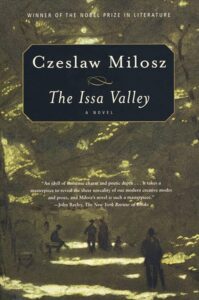The Issa Valley would not do well in an elevator pitch. Nor could it be easily described as “Book A meets Book B,” much less “Movie C meets Movie D.” The first sentence — “I should begin with the Land of Lakes, the place where Thomas lived.” — is not a grabber. (The first-person narrator never returns.) The first chapter is given over to landscape descriptions, with diversions into how practically every item in a home in the Issa Valley was made within the household, and into the reasons for the relative prosperity of of the villages along the river’s course. Thomas, having been named in the initial sentence, does not reappear in the first chapter. Or indeed the second, which opens with the notion that “The Issa Valley has the distinction of being inhabited by an unusually large number of devils” (p. 6) and continues with speculation on what they might be up to, and saying what the local farmers sometimes do to propitiate them.
Milosz’s book blithely breaks practically all of the norms of contemporary publishing. The point of view wanders a bit. The three-act structure is nowhere to be seen. There is barely a plot. There is not, properly speaking, a climax, nor is there a denouement, and there is definitely not a happily-ever-after. I cannot imagine that any part of it was workshopped, sent to beta readers, or circulated in any way to a marketing department or a sales team. The Issa Valley is where hype goes to die.
And yet it is a lovely, affecting book. First published in Polish in 1955, translated into English in 1978, the novel is neither old-fashioned nor a period piece; it passed directly into a kind of timelessness, in which the eternal human stories of birth and death, growing up and growing old, merge with the specifics of a particular corner of Lithuania in the first quarter of the twentieth century. Viewed from one angle, The Issa Valley has no stakes at all. The German invasion during the First World War consists of a couple of mounted soldiers who are given some milk and then ride on. The Soviet-Polish war passes not far away, but does not intrude on the closed world of the valley. There are no overarching threats, only the conflicts that the people themselves bring. But just like that, the stakes are life and death, honor and dishonor, the land passed down through generations, holdings divided among squabbling heirs or managed poorly. There are descendants of great lords whose daily life is barely distinguishable from their peasant neighbors, except that neither side ever, ever, ever forgets who is part of the nobility and who is not.
Though the story is set in the twentieth century, feudalism is not far away. Thomas, whose birth is noted in chapter three and whose story forms the spine of The Issa Valley, is the grandson of the lord of a minor manor. The grandfather is thought to be a genial and retiring fellow, and yet every delegation that goes up to the manor house to demand changes somehow comes back down feeling heard and respected, but with very little in the way of concrete gains. Even late in the book, when Polish and Lithuanian independence in the wake of the Great War are bringing reform to put more land in the hands of former peasants, he’s working with local officials to backdate a division of the estate among family members that would bring each share below the threshold of the reforms. Not only that, he’s getting some of those same officials to classify forest as grassland, so that it, too, may escape reassignment to a neighboring village. Milosz does not take sides in these events, but it could hardly be clearer how privilege maintains its position even as empires fall and republics rise in their place.
Milosz’ evenhandedness enables, maybe even requires, readers to form their own opinions on the events that take place in the valley of the Issa. Beneath the apparent rural stillness, there is teeming human life. The new priest whose passionate affair leads to tragedy. The son of one of the poorest widows in the village who’s a charismatic leader among the areas boys, and is secretly wrestling with God for a sign of deliverance or damnation. There’s the forester Balthazar, who to a modern eye is clearly suffering from some kind of mental illness, but who is met with a complex mix of fear, sympathy and bewilderment when he ventures outside the woods where he built his cabin and maintains the most productive still in the district. Is his eventual fate just what he had coming to him, or could he have been helped? Did he want help? There are Thomas’ disparate grandmothers, who are old when the novel begins but who had long and engrossing stories of their own, hinted at in the pages of this one, emblems of the continuities of life.
And then there’s Milosz’ portrayal of Thomas, an autobiographical figure, but one who’s observed just as dispassionately as all the other people of the valley. Milosz shows how interests come and go, how he yearns for the time when he will be accepted as a man among the men of his community, and also how he preserves the imaginative life of a child. Thomas is sensitive and perceptive, and he’s torn, for example, between the mastery of hunting — a key skill in the region — and the terrible act of killing, of extinguishing a unique creature. The novel ends just as he is passing into adolescence, but it also shows several stages of inchoate love and lust as he grows. Contrarily, the book shows where Thomas’ attention wanders when he has to be among adults who are doing boring adult stuff like talking, talking, talking.
The Issa Valley is not contrived enough to fit into a pitch meeting; it insists on life.

